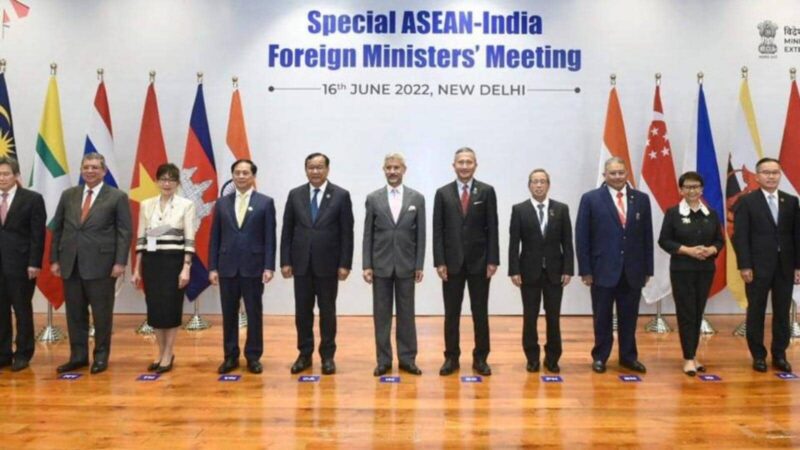This is the first time India has hosted a special meeting with ASEAN foreign ministers. The leaders agreed to increase cooperation in the main fields such as trade, connectivity, defense and security of cyberspace
Indian Foreign Minister and Association of Nation -Southeast Asian Nation (ASEAN) on Thursday discussed ways to respond to the impact of the Ukraine crisis on the regional economy and security and agreed to increase cooperation in the main fields such as trade, connectivity, defense and security Cyber.
This is the first time India has hosted a special meeting with the ASEAN Foreign Minister to mark the 30th anniversary of relations with 10 members of the grouping. The meeting was chaired by Foreign Minister S Jaisankar and his colleague Singapore Vivian Balakrishnan, who both referred to the impact of the war in Ukraine in his television opening remarks.
Jaisankar said the post-Pandemic recovery process had been complicated by developments in Europe when the Covid-19 crisis had not yet been fully reduced. “This pathway becomes more difficult with the geopolitical challenges that we face because of developments in Ukraine and their effects that knock on food and energy safety, as well as the price of fertilizers and commodities, and logistics and supply chain disorders,” he said.
Balakrishnan is more directly in his criticism of the Russian invasion of Ukraine, said Moscow’s actions have “reversed the system of international regulations and norms and international law that we all depend on and operate based on”. He added that “Sharpening of the Competition of a superpower between the US and China has direct implications for all of us in Asia”.
“This development, if not controlled, can threaten the entire peace and stability system that we rely on for the basis of our growth, development, and prosperity for decades,” Balakrishnan said.
Although the Myanmar Ambassador attended the meeting of Indian and ASEAN senior officials held in New Delhi on Wednesday, the country missed a meeting of clear foreign ministers on India’s decision to participate Military last year.
The Foreign Ministers of Laos and the Philippines also did not attend the meeting, apparently due to scheduling problems, and these countries were represented by senior officials.
The chairman’s statement, which was adopted in a round voice, said both parties agreed to work to increase the existing Indian-ASEAN strategic partnership to a comprehensive strategic partnership, and to start the initial review of the ASEAN-Indian trade agreement in the goods agreement in the goods (aitiga ) To make the Pact more user -friendly and simple.
They further agreed to accelerate the process of supporting the scope paper to review Aitiga so that the Committee with the ASEAN-India Free Trade Area (AIFTA) “can be activated to oversee the implementation of Aitiga Review”.
These steps, said the statement, will help achieve the full potential of ASEAN-India trade and economic partnerships, including through effective AIFTA implementation.
Foreign ministers also agreed to explore the synergy between the Master Plan on ASEAN Connectivity (MPAC) 2025 and Indian connectivity initiative under the “Act East” policy. They stressed the need to quickly complete and operate the Indian-Myanmar-Thailand trilateral highway, and to expand it east to Laos, Cambodia and Vietnam, as well as the need for stronger air and maritime connectivity.
Repeating their commitment to multilateralism based on international law, including the 1982 UN Convention on Sea Law (UNCLOS), both parties agreed to support ASEAN centrality in developing regional architecture based on rule.
They also agreed to explore the cooperation between ASEAN views on Indo-Pacific (AOIP) and Indo-Pacific Ocean Initiative (IPOI), especially in maritime security and connectivity, disaster risk management, search and rescue operations, and environmental protection.
In addition to the informal meeting proposed from the ASEAN-Indian Defense Minister in November and the proposed ASEAN-Indian maritime training, the meeting discussed cooperation in fighting terrorism and trans-national crimes through the initial finalization of senior officials’ meetings on this issue.
Jaisankar said the role of ASEAN had become more important given the geopolitical and uncertain challenges. A strong convergence between Aoip and IPOI is a testimony of the joint vision of both parties for the region, he said.
“India and ASEAN which are more connected will be well positioned to promote decentralized globalization and a strong and reliable supply chain that is needed by the international community,” Jaisankar said.
The Foreign Ministers together asked Prime Minister Narendra Modi, and national security adviser Ajit Dooval was present at this meeting.
India and ASEAN first established a sectoral partnership in 1992, before increasing ties with peak level partnerships in 2002 and strategic partnerships in 2012.
ASEAN includes Brunei, Cambodia, Indonesia, Laos, Malaysia, Myanmar, the Philippines, Singapore, Thailand and Vietnam. India has a strong political and security relationship with many group members.
